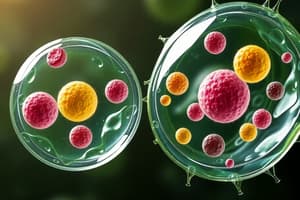Podcast
Questions and Answers
What is the main concept of Cell Theory?
What is the main concept of Cell Theory?
- Cells can arise spontaneously from non-living matter.
- All living organisms are made of cells. (correct)
- Only eukaryotic organisms are composed of cells.
- Cells can live independently of each other.
What is a key feature of prokaryotic cells?
What is a key feature of prokaryotic cells?
- Presence of a nucleus.
- Complex internal structures.
- Lack of a true nucleus. (correct)
- Generally larger size compared to eukaryotic cells.
According to the endosymbiotic theory, chloroplasts originated from what?
According to the endosymbiotic theory, chloroplasts originated from what?
- Viruses that invaded eukaryotic cells.
- Free-living prokaryotes that were engulfed. (correct)
- Genetic material that was incorporated into plant cells.
- Membrane-bound organelles within ancient bacteria.
Which of the following best describes animal cells?
Which of the following best describes animal cells?
What is the function of ribosomes during protein synthesis?
What is the function of ribosomes during protein synthesis?
What occurs during the mitotic phase of the cell cycle?
What occurs during the mitotic phase of the cell cycle?
What impact do mutations have on an organism?
What impact do mutations have on an organism?
What is the role of the Golgi apparatus in a cell?
What is the role of the Golgi apparatus in a cell?
Flashcards
Cell Theory
Cell Theory
All living things are made of cells, the basic unit of life, and cells arise from other cells.
Prokaryotic Cell
Prokaryotic Cell
Simple cell with no nucleus or membrane-bound organelles ;example: bacteria
Eukaryotic Cell
Eukaryotic Cell
Complex cell with a nucleus and membrane-bound organelles; examples: plant and animal cells.
Endosymbiosis
Endosymbiosis
Signup and view all the flashcards
Mitosis
Mitosis
Signup and view all the flashcards
Meiosis
Meiosis
Signup and view all the flashcards
Protein Synthesis
Protein Synthesis
Signup and view all the flashcards
Mutation
Mutation
Signup and view all the flashcards
Study Notes
Cell Theory
- All living things are composed of cells, the fundamental units of life.
- Cells originate from pre-existing cells, carrying the genetic material necessary for life.
Prokaryotic vs. Eukaryotic Cells
- Prokaryotes: Simple cells lacking a nucleus (e.g., bacteria).
- Eukaryotes: Complex cells with a nucleus and membrane-bound organelles like mitochondria (e.g., plants and animals).
Endosymbiosis
- Mitochondria and chloroplasts evolved from free-living prokaryotes that were engulfed by ancestral eukaryotes, establishing a symbiotic relationship.
Cell Types: Comparison
- Bacteria: Prokaryotic, small, lack a nucleus, have a cell wall.
- Plant Cells: Eukaryotic, contain chloroplasts, cell walls, and large central vacuoles.
- Animal Cells: Eukaryotic, lack cell walls, possess centrioles and lysosomes.
Cellular Organelles
- Cellular organelles (e.g., nucleus, mitochondria, chloroplasts, Golgi apparatus) carry out specific functions for proper cell operation.
Viruses
- Viruses are non-living entities, composed of genetic material (DNA or RNA) coated in protein.
- Viruses depend on host cells for reproduction.
Cell Cycle
- The cell cycle describes a cell's life, involving growth stages (G1, S, G2) and division phases (mitosis or meiosis).
Mitosis
- Mitosis is the process of cell division for somatic cells, producing two identical daughter cells.
Meiosis
- Meiosis is a special cell division in reproductive cells, creating gametes (sperm and egg) with half the chromosome number, enabling genetic variation.
Replication
- Replication is the process of duplicating DNA to provide each new cell with an identical copy during division.
Protein Synthesis
- Transcription: DNA's instructions are converted into mRNA.
- Translation: mRNA's instructions are used to build proteins by ribosomes. Proteins dictate cell structure and function.
Mutations
- Mutations are changes in the DNA sequence potentially altering gene function.
- Mutations can be harmful, beneficial, or neutral, influencing an organism's traits or causing diseases.
Studying That Suits You
Use AI to generate personalized quizzes and flashcards to suit your learning preferences.



